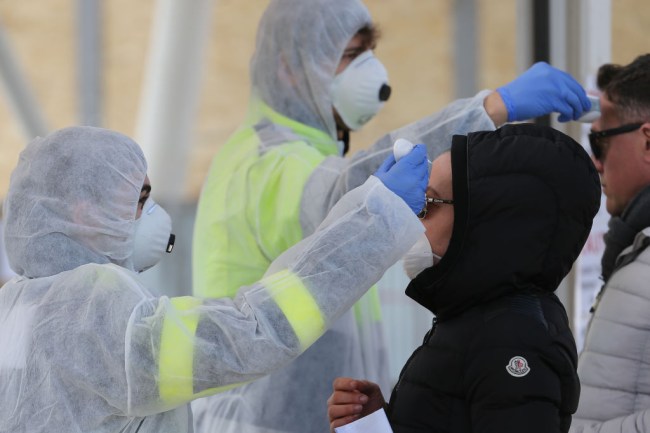
Getty Image / Marco Cantile / Contributor
The coronavirus pandemic is ravaging the entire world. Entire countries are on strict lockdowns, sports leagues are being canceled, concerts are being postponed, and there have been panic-induced store purges for toilet paper. Let’s look at possible prevention methods for the coronavirus, the supplies you’ll need to stock up on, and answer the question of “Can my pet get COVID-19?”
WHAT IS SOCIAL DISTANCING?
The Centers for Disease Control and Prevention (CDC) defines “social distancing” as “remaining out of congregate settings, avoiding mass gatherings, and maintaining distance from others when possible. You can read more about social distancing, how it has been effective in prior pandemics and more in this article.
WHAT OTHER KINDS OF CORONAVIRUS PREVENTION ARE THERE?
Washing your hands frequently with water and soap is the best way to stop the spread of diseases, including COVID-19. You should wash your hands for at least 20 seconds with warm water and soap.
The other coronavirus advice that you’ve probably heard is to not touch your face. Microbes can be transferred from your fingers and into your body when you touch your face. Microbes enter the body through your nostrils, eyes, or mouth. These microbes can cause a viral infection, such as COVID-19, once inside the body.
The CDC recommends that everyone self-monitor themselves for any of the coronavirus symptoms. Self-monitoring means being observant of your breathing and taking your temperatures twice a day.
Symptoms of COVID-19 include fever, cough, or difficulty breathing. If you feel as though you have the coronavirus symptoms, the CDC recommends that you should also seek advice by telephone from a healthcare provider or their local health department to determine whether a medical evaluation is needed.
If you feel sick you should self-isolate, meaning limit contact with others and don’t travel. It is also advised that people self-quarantine for high-risk cases, such as coming in contact with someone who has tested positive for the coronavirus. Quarantines should last at least 14 days.
WHAT SUPPLIES SHOULD I STOCK UP ON?
Before you get sick, you should be prepared and have enough supplies for at least two weeks. That means food, especially non-perishable items such as canned foods, nuts, grains, pasta, peanut butter, and water. You should also be stocked with any prescribed medications as well as ibuprofen to combat fever. You should have plenty of soap, hand sanitizer, alcohol swabs, and cleaning supplies to keep your apartment or house as hygienic as possible. And of course, make sure you have toilet paper. Not sure you need to buy the entire stock of TP from your local Costco, but enough for a few weeks.
HOW DO I KEEP MY HOME SAFE FROM SPREADING COVID-19?
You should regularly disinfect high-touch areas such as doorknobs, countertops, handles, toilets, phones, and keyboards. You can find a list of EPA-approved disinfectants on the CDC website.
CAN I GET MY PET SICK?
There is no evidence that humans can transmit COVID-19 to pets such as cats and dogs, and vice-versa. The SARS-CoV-2 virus spreads from humans to humans. The World Health Organization (WHO) said that “currently, there is no evidence that pets such as dogs and cats have infected humans with Covid-19.”
“While this virus seems to have emerged from an animal source, it is now spreading from person-to-person in China,” the CDC said. “There is no reason to think that any animals including pets in the United States might be a source of infection with this new coronavirus.”
“To date, CDC has not received any reports of pets or other animals becoming sick with COVID-19. At this time, there is no evidence that companion animals including pets can spread COVID-19,” the CDC continued. “However, since animals can spread other diseases to people, it’s always a good idea to wash your hands after being around animals.”
CAN I CATCH COVID-19 MORE THAN ONCE?
Those infected with the coronavirus will build up a protective antibody against the disease. However, there is still a chance that you can catch the coronavirus twice or more.
“However, in certain individuals, the antibody cannot last that long. For many patients who have been cured, there is a likelihood of relapse,” said Li QinGyuan, director of pneumonia prevention and treatment at the China-Japan Friendship Hospital in Beijing.
Health officials in China’s Guangdong province said that 14 percent of people who recovered in the province were later retested and the results came back positive.
You can find all of the CDC’s data on coronavirus, including prevention and COVID-19 updates, on their website.